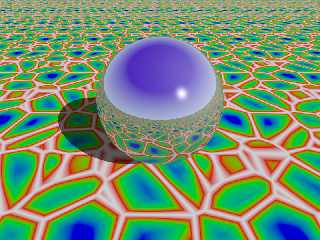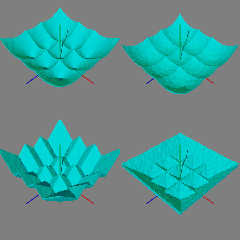 |
 |
|
 |
|
 |
|  |
|  |
|
 |
|
 |
|  |
|  |
|
 |
The crackle pattern can now be repeated:
pigment {
crackle
...
repeat VECTOR
}
where VECTOR is a vector of three integers, each specifying the interval
at which the pattern is to be repeated along the respective axis (0 for
no repetition)
Windows binaries are currently being built.
Post a reply to this message
Attachments:
Download 'test.png' (630 KB)
Preview of image 'test.png'

|
 |
|  |
|  |
|
 |
|
 |
|  |
|  |
|
 |
On 03/09/2016 08:31 AM, clipka wrote:
> The crackle pattern can now be repeated:
>
> pigment {
> crackle
> ...
> repeat VECTOR
> }
>
> where VECTOR is a vector of three integers, each specifying the interval
> at which the pattern is to be repeated along the respective axis (0 for
> no repetition)
>
> Windows binaries are currently being built.
>
Cool!
I wish for a definable voronoi-seed points extension to crackle too...
Something like Jérôme's voronoi patch, but as part of the crackle
pattern itself. :-)
Bill P.
Post a reply to this message
|
 |
|  |
|  |
|
 |
|
 |
|  |
|  |
|
 |
Am 09.03.2016 um 14:47 schrieb William F Pokorny:
> I wish for a definable voronoi-seed points extension to crackle too...
> Something like Jérôme's voronoi patch, but as part of the crackle
> pattern itself. :-)
It does make sense to use a separate pattern type for a general Voroni
pattern. The algorithm used in the crackle pattern can only handle the
special case where each unit cube of 3D space contains exactly one seed
point.
Post a reply to this message
|
 |
|  |
|  |
|
 |
|
 |
|  |
|  |
|
 |
On 03/09/2016 08:58 AM, clipka wrote:
> Am 09.03.2016 um 14:47 schrieb William F Pokorny:
>
>> I wish for a definable voronoi-seed points extension to crackle too...
>> Something like Jérôme's voronoi patch, but as part of the crackle
>> pattern itself. :-)
>
> It does make sense to use a separate pattern type for a general Voroni
> pattern. The algorithm used in the crackle pattern can only handle the
> special case where each unit cube of 3D space contains exactly one seed
> point.
>
Ah, OK - that I didn't know. Thanks. :-)
Bill P.
Post a reply to this message
|
 |
|  |
|  |
|
 |
|
 |
|  |
|  |
|
 |
Le 09/03/2016 14:47, William F Pokorny a écrit :
> On 03/09/2016 08:31 AM, clipka wrote:
>> The crackle pattern can now be repeated:
>>
>> pigment {
>> crackle
>> ...
>> repeat VECTOR
>> }
>>
>> where VECTOR is a vector of three integers, each specifying the interval
>> at which the pattern is to be repeated along the respective axis (0 for
>> no repetition)
>>
>> Windows binaries are currently being built.
>>
> Cool!
>
> I wish for a definable voronoi-seed points extension to crackle too...
> Something like Jérôme's voronoi patch, but as part of the crackle pattern itself.
:-)
>
Thank you for interesting me again in crackle-like pattern.
There is plenty of things about crackle that I had forgotten, like form, metric,
offset and solid.
voronoi and masonry are only very specialised versions in this regard, as they apply
*solid* implicitly.
A non-solid voronoi, with support of form, metric and offset... mmmhhh, need a name
for it.
And may be a variation of voronoi with support of metric (form and solid seems
opposite, and offset seems useless).
Post a reply to this message
|
 |
|  |
|  |
|
 |
|
 |
|  |
|  |
|
 |
On 03/09/2016 03:35 PM, Le_Forgeron wrote:
> Le 09/03/2016 14:47, William F Pokorny a écrit :
>>
>> I wish for a definable voronoi-seed points extension to crackle too...
>> Something like Jérôme's voronoi patch, but as part of the crackle pattern itself.
:-)
>>
>
> Thank you for interesting me again in crackle-like pattern.
>
> There is plenty of things about crackle that I had forgotten, like form, metric,
offset and solid.
> voronoi and masonry are only very specialised versions in this regard, as they apply
*solid* implicitly.
>
> A non-solid voronoi, with support of form, metric and offset... mmmhhh, need a name
for it.
>
> And may be a variation of voronoi with support of metric (form and solid seems
opposite, and offset seems useless).
>
I have myself used metric, form and solid from crackle, but I've never
found a use for offset (Has anyone else?). Not quite sure with just a
sip or two of coffee if I completely follow your form and solid being
opposites statement...
I also frequently use the wave modifiers with crackle - turbulence,
poly_wave etc. Given we'd control the point set we could implement
turbulence to a regular point set ourselves, but having built in
turbulence would certainly be handy. poly_wave, etc, I think would need
to be inbuilt.
I had some ideas for metric too - that might apply to crackle as well.
Let me dig into some old work with crackle this morning to refresh
crackle in my own mind. I'll follow up with another post in a while.
Aside: Christoph, with the new repeat keyword, has - at least to some
extent - addressed one of the things I wished for from definable voronoi
point sets. I was thinking with control of the points, I could mirror
the point set environments myself around the crackle pattern I wished to
tile. Suppose this suggests a repeat keyword for any new
non-solid-voronoi pattern would be handy, if not absolutely needed. :-)
Bill P.
Post a reply to this message
|
 |
|  |
|  |
|
 |
|
 |
|  |
|  |
|
 |
On 03/10/2016 07:13 AM, William F Pokorny wrote:
> ...
> I had some ideas for metric too - that might apply to crackle as well.
> Let me dig into some old work with crackle this morning to refresh
> crackle in my own mind. I'll follow up with another post in a while.
> ...
OK. After a morning of playing some thinking aloud...
- I now take you to mean form and solid do not work together when you
say they are opposites.
- It looks like the offset keyword does get used in a couple of the
textures Norbert gathered into his initial 300 materials collection.
There is too crackle3.pov showing the offset does have an effect though
much more apparent at >>1 in my experimentation. In finding some of my
old crackle experiments, it looks like I tried to use the offset with
solid, and like using form with solid, it does nothing. I suppose even
finding actual usage, I like you, wonder about the value of offset. It
looks like it shifts the response, but this kind of thing can be done
with pattern wave modifications. Suppose from what I see, I think it of
not much value as a stand alone keyword despite being available with
crackle.
- Being able to define the point set with a DF3 file would be very
useful for large, somewhat regular, 3D point sets. Say > some threshold
value at a voxel position means consider this a point to the voronoi. A
function based method for specifying points perhaps the most flexible
and it would cover DF3s too - thinking of the new user defined camera's
method for specifying x,y,z.
- I think it might be most natural to use your existing voronoi name as
the eventual name, but not opposed to another name.
- I mentioned new ideas for metric. After digging up old experiments, I
suspect the existing metric calculation is not a good fit for what I was
trying, but I'll toss the ideas onto the table for thought.
The voronoi diagram in 2D can be represented by cones as many know. See
for example :
https://smathermather.wordpress.com/2012/01/20/fast-calculation-of-voronoi-polygons-in-povray/
Further, one of the struggles we all have with isosurfaces is coming up
with the mathematical definitions to do what we want.
I had the thought that reasonably complex shapes could be defined
quickly with a user passing nothing more than a point list. Each point
in my initial test implementation defined the tip of an inverted cone
function.
I then thought why not let the points define more than cones. In the
attached image and for the same input point set we have: The normal
voronoi/cone result in the upper left; Using a dome function in the
upper right; Using a pyramid function in the lower left; Using an
octagon function in the lower right.
The idea, I guess, is a voronoi "metric" which amounts to an expanding
shape about each point which terminates on first collision with one or
more other expanding shapes. In this manner, what we think of as the
typical voronoi result is a subset of the "voronoi" diagrams possible
from a set of points and shape functions.
Aside: On my todo list to code up a new function which take a point list
and a matching list of selected functions so I can experiment with much
larger point lists.
Bill P.
Post a reply to this message
Attachments:
Download 'ptisodemo.jpg' (117 KB)
Preview of image 'ptisodemo.jpg'

|
 |
|  |
|  |
|
 |
|
 |
|  |
|  |
|
 |
clipka wrote on 09/03/2016 14.31:
> The crackle pattern can now be repeated:
>
> pigment {
> crackle
> ...
> repeat VECTOR
> }
>
> where VECTOR is a vector of three integers, each specifying the interval
> at which the pattern is to be repeated along the respective axis (0 for
> no repetition)
>
> Windows binaries are currently being built.
>
Very interesting!
;-)
Paolo
Post a reply to this message
|
 |
|  |
|  |
|
 |
|
 |
|  |
|
 |




![]()